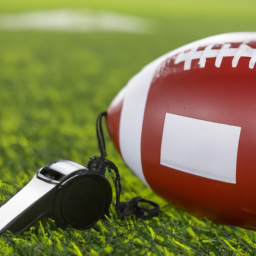In recent discussions surrounding the New York Jets, cornerback Sauce Gardner has expressed his frustrations regarding officiating during games, suggesting that the referees are unfairly targeting him due to the teams losing record. This assertion raises important questions about the relationship between team performance and officiating in professional sports. Gardner, who has quickly established himself as one of the premier cornerbacks in the NFL, believes that the scrutiny he faces from officials is disproportionate. In his view, the Jets struggles on the field have led to a bias against him, resulting in more penalties and calls that he feels are unjust. This sentiment is not uncommon among players on losing teams, who often feel that their performance is scrutinized more closely than that of players on winning teams. The implications of Gardners claims extend beyond personal grievances. They touch on a broader issue within professional sports: the perception of officiating fairness. In my experience covering the NFL, it is evident that players often feel the weight of their teams performance on their shoulders, and this can lead to heightened emotions during games. When a team is losing, players may feel that every call against them is a reflection of their struggles, leading to a cycle of frustration and blame directed at officials. Research in sports psychology suggests that players perceptions of officiating can be influenced by their teams performance. Studies show that athletes on losing teams are more likely to perceive officiating as biased or unfair. This phenomenon can create a feedback loop where players become increasingly frustrated, which may, in turn, affect their performance on the field. The emotional toll of feeling targeted can lead to decreased focus and increased penalties, further compounding the issues faced by struggling teams. Experts in sports officiating note that referees are trained to remain impartial, regardless of a teams record. However, the reality is that human error and subjective judgment inevitably play a role in officiating. According to official reports from the league, the NFL has implemented various measures to improve officiating consistency, including the use of technology and enhanced training protocols. Yet, the perception of bias remains a significant concern among players and fans alike. Gardners situation highlights the challenges faced by officials in maintaining objectivity. As observed in various games, players often react emotionally to calls, especially in high-stakes situations. This emotional response can lead to confrontations with officials, further complicating the dynamics on the field. The pressure to perform, combined with the fear of being penalized, can create a tense environment that affects not only the players but also the officials tasked with enforcing the rules. The Jets current losing streak adds another layer of complexity to Gardners claims. As the team struggles to find its footing, the pressure on players intensifies. This pressure can manifest in various ways, including increased scrutiny from officials. According to government data on sports officiating, players from teams with poor performance records tend to receive more penalties, which may support Gardners assertion that losing teams face a different level of scrutiny. Moreover, the media plays a crucial role in shaping public perception of officiating. Coverage of controversial calls can amplify players frustrations, leading to a narrative that reinforces the idea of bias. This media attention can create a feedback loop, where players feel justified in their claims of unfair treatment, further complicating the relationship between officiating and team performance. In light of Gardners comments, it is essential to consider the broader implications for the Jets and their approach moving forward. The team must find ways to mitigate the emotional toll of losing and the perception of being targeted by officials. This may involve focusing on mental resilience and fostering a culture that emphasizes accountability and teamwork, rather than allowing frustrations with officiating to dominate their mindset. Experts agree that addressing these issues requires a multifaceted approach. Teams must prioritize mental health and emotional well-being, providing players with the tools to cope with the pressures of competition. Additionally, ongoing dialogue between players, coaches, and officials can help bridge the gap between perceptions and reality in officiating. As the season progresses, it will be interesting to see how Gardner and the Jets navigate these challenges. Will they be able to rise above the frustrations of perceived bias and focus on improving their performance on the field? Or will the weight of their losing record continue to affect their mindset and interactions with officials? In conclusion, Sauce Gardners claims about officiating bias reflect a broader issue within professional sports. The interplay between team performance and officiating perceptions is complex and multifaceted. As the Jets work to improve their standing in the league, addressing these concerns will be crucial for their success. By fostering a culture of resilience and open communication, they may be able to overcome the challenges posed by officiating and focus on what truly matters: winning games.
TRENDING NOW
WORLD
Global Messaging Trends: Can Local Apps Like Arattai Overtake Giants?
44% 🔥
POLITICS
Accusations fly over whether Republicans or Democrats 'own' shutdown
35% 🔥
POLITICS
Rep. Mike Haridopolos, R-Fla., talks about the government shutdown
34% 🔥
POLITICS
What happens now that the government has shut down. And, a pricing deal with Pfi...
26% 🔥
POLITICS
Married, but no connection: Reality of silent divorces in Indian homes
31% 🔥
POLITICS
Netanyahu's apology to Qatar, phone on Trump's lap: A telling White House photo
38% 🔥
MOST READ
SPORTS
Week 5 NFL odds, lines, betting picks, spreads: 2025 predictions: Model backs Sa...
55% 🔥
SPORTS
Predicting every undefeated college football team's first loss: Will anyone beat...
36% 🔥
SPORTS
Tigers Lefty Tarik Skubal Deserves Second Straight AL Cy Young Award
54% 🔥
SPORTS
Jets Get Official Braelon Allen Injury Diagnosis
61% 🔥
SPORTS
Gill: India won't be 'looking for any easy options' against West Indies
49% 🔥
SPORTS
Phil Mickelson takes a jibe at golf during friendly banter with ex-LIV Golf CEO’...
39% 🔥

